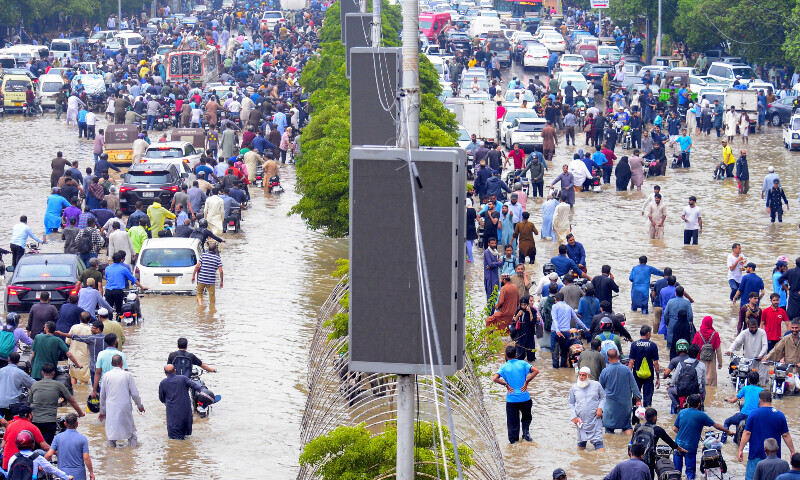Education
Public holiday today as Karachi declares emergency in the wake of heavy rain
By Naeem Ahmed •

In a separate notification, the Sindh government’s school department has ordered all private and public educational institutions under its purview in the city to remain closed today due to the heavy rainfall.
With citizens experiencing extended power failures, traffic jams and general mayhem as heavy rain on Tuesday, Karachi Mayor Murtaza Wahab declared a rain emergency amid warnings of more showers to come.
According to the Met Office, as of 8pm Tuesday, Gulshan-i-Hadeed had recorded the highest level of rain at 170 millimetres, followed by Airport Old Area at 158.5mm, Jinnah Terminal 153mm, Nazimabad 149.6mm, Surjani Town 145.2mm, Keamari 140mm, Saadi Town 140.2mm, Defence Housing Authority Phase VII 134mm, University Road 133mm, PAF Base Faisal 128mm, North Karachi 108.4mm, Korangi 132.2mm, Gulshan-i-Maymar 98mm, PAF Masroor Base 87mm, Orangi Town 66.2mm and Bahria Town 4.8mm.
It continued to pour intermittently over large parts of the city late into Tuesday night, with prayers the only resort for citizens facing prolonged electricity breakdowns with no end in sight.
According to a notification issued by the Karachi Metropolitan Corporation (KMC), the mayor “cancelled all types of leave, including weekly holidays” for the essential services departments, directing them to remain available.
He also directed the municipal services, the fire brigade and Urban Search and Rescue (USAR) departments of KMC to establish a Rain Emergency Cell in coordination with all essential services departments.
On the instructions of the Karachi East Zone’s Deputy Inspector General (DIG) Dr Farrukh Ali, the East Zone police is on high alert to deal with the possible effects of rains, the DIG’s Media Cell said in a statement.
“Clear orders have been issued to all SDPOs (sub-divisional police officers) and SHOs (station house officers) to remain present in their respective areas, ensure drainage, traffic flow and take immediate steps to deal with any emergency,” the statement said.
It added that the DIG had instructed that the protection of life and property of citizens should be ensured at all costs, paying special attention to low-lying areas. Rescue teams and helplines should be kept active, and timely guidance and assistance should be provided to the public.
The DIG statement also appealed to citizens to avoid unnecessary movement during bad weather, advising them to contact 15 or the nearest police station immediately in case of any emergency.
“Police are with the public at all times in all weathers,” it added.
Sindh Local Government Minister Saeed Ghani contacted various town chairmen, municipal committee chairmen and municipal commissioners over the phone to seek details regarding the situation after the rains.
The chairmen of all towns and union councils and the municipal commissioners should immediately use all resources to drain water from the roads on an emergency basis.
“In the first phase, all important highways should be cleared so that the delivery of machinery or other equipment to the affected areas can be ensured,” he said in a statement from his office, adding that small highways and roads should be tackled next.
He urged citizens to limit their movement due to water on the roads to avoid any accidents, and also urged them to stay away from power poles and other electrical installations.
“In some areas, due to the power outage by K-Electric, sewage pumping stations are facing difficulties. As an alternative, these pumping stations are being operated with emergency generators,” he said.
A rain emergency cell was also established at the Governor’s House, with citizens impacted by the rain and traffic directed to immediately reach out for help at 1366.
The cell will remain active around the clock and provide timely aid to victims.
“Citizens will not be left alone in difficult times; all possible facilities will be provided,” Sindh Governor Kamran Tessori was quoted as saying in a statement.
Monsoon rains fall across the region from June to September, offering respite from the summer heat and are crucial to replenishing water supplies. However, heavy downpours also trigger deadly floods, landslides and displacement, particularly in vulnerable, poorly drained, or densely populated areas.
On Monday, Sindh Minister for Local Government Saeed Ghani had said that arrangements were in place to deal with the upcoming monsoon spell as parts of Karachi received light rain on Monday.
Sindh Chief Minister Syed Murad Ali Shah had chaired an emergency meeting to oversee preparations for the monsoon rains expected to impact Karachi and other parts of the province.
A press release from his office said CM Shah put all the local bodies, administration and traffic police on high alert, and directed them to strengthen coordination between the relevant departments and organisations.